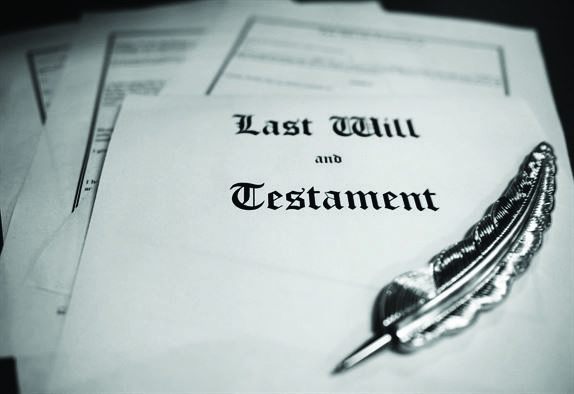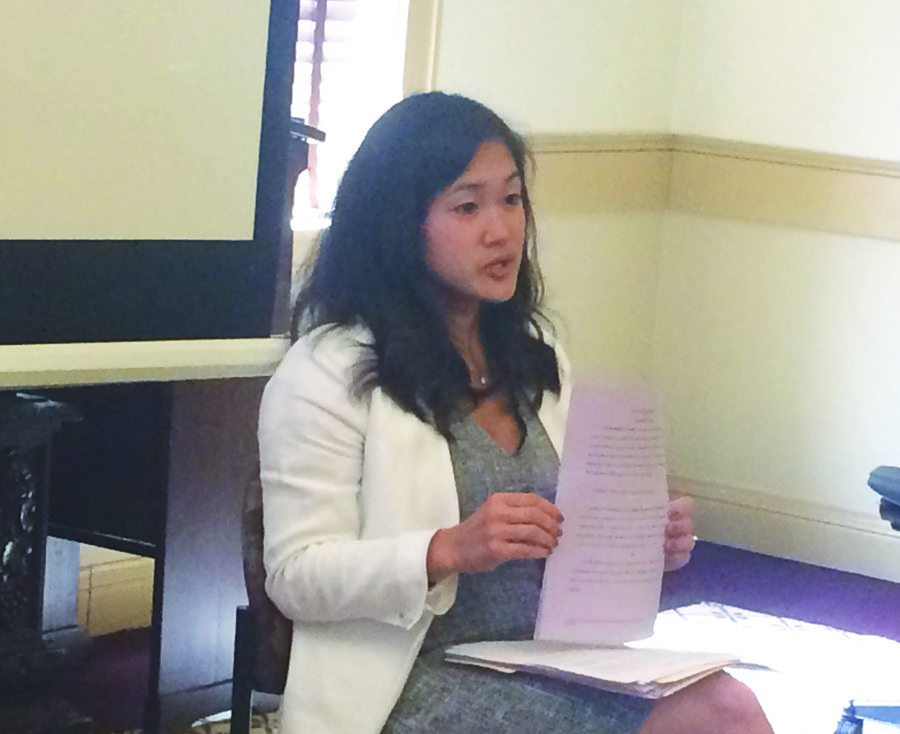Where there’s a will there’s a way
Legal matters after death focus of presentation

A legal will is an important way for a person’s estate to be handled after death. That subject was part of a Tuesday program at the Peter White Public Library. (Journal stock photo)
- A legal will is an important way for a person’s estate to be handled after death. That subject was part of a Tuesday program at the Peter White Public Library. (Journal stock photo)
- Below, Marquette attorney Marybeth Marin talks about “Legal Matters after Death” during the event. (Journal photo by Christie Bleck)
“Legal Matters after Death” was the subject of a Tuesday presentation, sponsored by the Northern Center for Lifelong Learning, at the Peter White Public Library in Marquette.
Attorney Marybeth Marin, a member of the Marin Law Firm in Marquette, addressed this issue.
Her law firm performs a lot of estate planning, which is multi-faceted.
“I think the most important question to start out with is: What happens when you die? And the answer to the question is typically ‘I don’t know’ or ‘It depends,'” Marin said.

Below, Marquette attorney Marybeth Marin talks about “Legal Matters after Death” during the event. (Journal photo by Christie Bleck)
Legally, paperwork is necessary, and there are many documents that can be in place to ensure someone’s wishes are carried out after that person’s death, she said.
Wills, power of attorney and trusts spring to mind.
“Those are all legal documents that you can draft while you’re still of sound mind to make sure that your assets and your valuable possessions and your minor children, even your dog and pets, are taken care of,” Marin said.
There is one main way to determine what document is best for a person, and that is whether he or she wants to go through probate, she said.
“Probate is the process that you have to go through with the probate court to get things where they need to be once you pass away,” said Marin, who added that process used to be expensive and time-consuming.
Now probate isn’t that difficult.
“You still have to go through the court,” Marin said. “You still have to open the estate, follow their rules, pay their fees and wait six months before you can close the estate.”
With a will, a personal representative — the person who’s going to carry out whatever’s in that document — will be appointed, with an alternative personal representative also named.
“You direct how your debts will be handled,” Marin said, with the personal representative having the authority to pay off outstanding debts. If there any assets left over, they will be distributed according to the will.
She gave a little side note about banks.
“In the event that you have a debt with a bank and you also have an account with money in it in the bank, and the bank finds out that you passed away before your personal representative deals with that money or that debt, the bank can hold those funds that it has because you have a debt there,” Marin said.
She acknowledged some people want to avoid probate, which happens when assets are held only in that person’s name. But what if you have assets in a joint account, or beneficiaries?
“Those are ways to avoid probate,” Marin said.
Power of attorney is another estate-related document.
There are two powers of attorney — medical and financial.
“Those are active only when you’re living,” Marin said.
A medical power of attorney, also called a living will, determines how the person wants to be treated in the case of incapacitation, she noted, while a financial power of attorney takes effect immediately.
“No doctor needs to say that I’m not able to manage my finances,” Marin said of the latter document. “No person needs to say that I don’t know what I’m talking about when I go to the bank. As soon as that power of attorney is drafted, I can use it.”
A trust is more complicated.
“If you have a trust, you will not have to go through probate unless you obtain something after you wrote the trust that you forgot to put in the trust, which actually happens a lot,” Marin said.
There are two types of trust: living and testamentary.
A living trust, as its name says, continues while a person’s living whereas a testamentary trust takes effect only upon a person’s death, she said.
Trusts, though, are longer and more complex than other documents.
“What you are doing when you have a trust is you are putting whatever you want — let’s say you’re putting all your assets into this trust — you are creating this fictional legal entity of a trust, and giving that legal entity control of anything you put into,” Marin said.
A trustee will manage the assets in the trust, not own them.
Marin said her law firm recommends a trust in certain situations.
“One is if you have minor children,” Marin said. “The other is if you have children with special needs. The third is if you and your spouse are making millions of dollars, you might put all your money into what’s called a credit shelter trust and get some tax breaks.”
Another possibility involves an asset that’s in a single person’s name or multiple people’s names, which is used by more than one person. One example is a family camp.
“We recommend that we only use a trust in those scenarios because we truly believe that you can take care of your other assets and avoid probate in other ways that don’t require a trust,” Marin said. “But you can’t take care of those four scenarios that I just listed without a trust.”
What if a person dies without a will, trust or other document?
“The probate estate still needs to be opened,” Marin said, with the court appointing a personal representative, most likely a spouse.
After debts are paid, the remaining assets are divided based upon intestate succession, she said.
“The reason why you want a will is then you can say exactly who you want to get what money, if any,” Marin said.
Sally Olsen of Marquette Township listened to the presentation with great interest, pointing out it’s good to review pre-death legal matters.
“Laws change and lives change,” Olsen said. “New questions come up.”
Regardless of the document, there is a common goal.
“Your assets ultimately, usually, get to the right place,” Marin said.
Christie Bleck can be reached at 906-228-2500, ext. 250. Her email address is cbleck@miningjournal.net.







